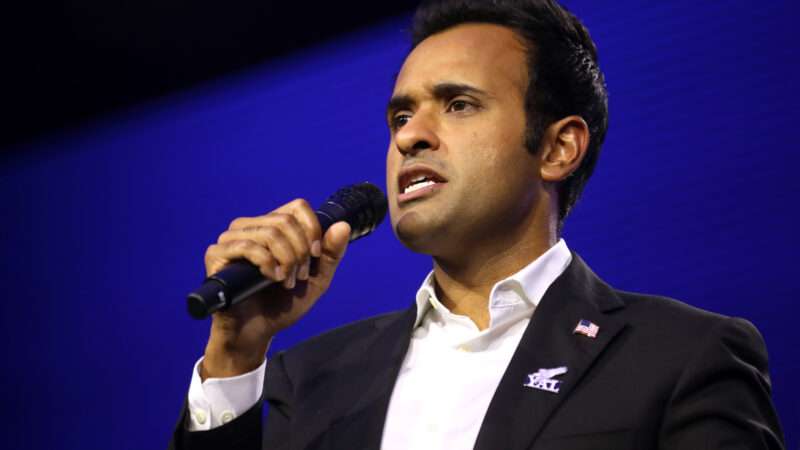
Vivek Ramaswamy is clearly having a moment. An entrepreneur with no political experience whatsoever, the fast-talking Republican presidential aspirant has risen rapidly in the polls; in some of them, he has even surpassed Florida Gov. Ron DeSantis to take second place. (Former President Donald Trump remains the runaway leader.)
Heading into the debate tonight, Ramaswamy definitely had a spotlight on him, and it shone ever brighter as he picked fights with the other candidates. He attacked former New Jersey Gov. Chris Christie for speaking out against Trump and claimed that former United Nations Ambassador Nikki Haley was angling for a job at a defense contractor.
Ramaswamy frequently enjoyed the crowd's support, and some of his most popular remarks were grounded in libertarian notions. On foreign policy, in particular, Ramaswamy distinguished himself from every other candidate on the stage—with the possible exception of DeSantis, who hit many of the same notes—by refusing to cosign the neoconservatism of his rivals.
"The only war that I will declare as president is the war on the federal administrative state," he said.
Ramaswamy was adamant that he would not support additional military aid to Ukraine. This stance put him at odds with every other candidate save DeSantis, but it is increasingly popular with the GOP base. A recent CNN/SSR poll found that 71 percent of Republicans do not want Congress to authorize more funding, and 69 percent believe that the U.S. has already done enough.
Ramaswamy has also proposed cutting military assistance to Israel, a stance that earned Haley's ire on the debate stage but is supported by many libertarian-adjacent political figures and tracks with Americans' general disdain for foreign aid (though they tend to overestimate how much the government spends on it).
One reason for Trump's conquest of the Republican Party was that he broke with GOP orthodoxy on foreign policy; he called the Iraq War a mistake and pledged to pull U.S. troops out of Afghanistan. These ideas were anathema to party leadership, though anti-war Republican candidates who preceded Trump—including, most notably, Ron Paul in 2008 and 2012—showed that non-interventionism was broadly popular among the base. The rank-and-file lost faith in Bush-era nation-building long before GOP leaders realized it, and Trump's successful run was a wake-up call—though, of course, Trump failed to pursue genuinely anti-interventionist policies; on the contrary, he installed former Bush administration official John Bolton as national security advisor.
Ramaswamy seems poised to capture some of the same Trumpian energy. Much like Trump, his foreign policy prescriptions were not entirely libertarian; like Trump, he is hawkish on China. He also proposed militaristic policies to deal with the U.S. southern border, suggesting that resources currently being sent to Ukraine should instead be redirected there. This would involve a massive escalation of police and military power, which is hardly libertarian.
However, on this issue, he was in good company—most of the candidates seemed to prefer deploying vastly more police and military resources against Mexican cartels as opposed to confronting the failures of prohibition. A wholly libertarian foreign policy would involve not merely a reorganization of U.S. military and defense spending, but a decrease.
The post Vivek Ramaswamy: 'The Only War I Will Declare…Is on the Administrative State' appeared first on Reason.com.







